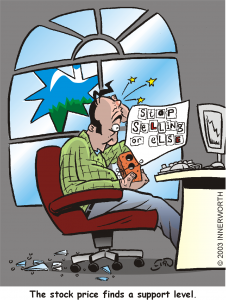How do you react to unanticipated events during the trading day? When you are trying to put on a position, are you upset when you can’t get a complete fill? When your DSL line goes down, do you react with anger or frustration? When you make a trading error, do you react with self-reproach? When your money is on the line, it’s natural to strive for perfectionism and seek out complete control. If only we could control the world to such a great extent that there was no uncertainty, a world where all is known. Unfortunately, we can’t. In the end, we must accept uncertainty and work around it. It is vital to anticipate all possible outcomes, and avoid over-reacting.
Our expectations often control our emotions. When our expectations don’t match what actually happens in our lives, we react emotionally and often impulsively. We have a natural human desire to win but often face many trading losses. Trading is a profession where you should work under the assumption that you should see more losing trades than winners, so expecting to win is likely to produce frustration or disappointment. To the novice trader, especially, this fact of life can be stress producing and somewhat disturbing. But it doesn’t have to overwhelm you. If you are caught off-guard, a losing trade or unexpected setback will disappoint you. If you anticipate it, however, you’ll stay calmer and more relaxed, ready to take decisive action to remedy the situation.
It’s vital to anticipate adverse events rather than react impulsively and emotionally. Consider the ideal way of reacting to a common, everyday event. A pet peeve of many drivers in rush hour traffic is that fellow drivers are not very courteous. They often impatiently cut off other drivers, drive too fast, and change lanes too frequently. One may experience “road rage” if he or she steadfastly held the belief that “drivers should obey all traffic laws and make no driving errors.” Consider the various ways that you might react to such an event. If you believe that such events should never happen and that it should not happen to you, you will react with anger. And if you are too angry, you may not pay close enough attention and get into an accident.
If, on the other hand, you anticipate potential problems, you’ll be able to focus on what to do next. Rather than get angry and become distracted, you will calmly think about how to take evasive action to protect yourself. Rather than accidentally running into the car as it cuts you off, you’ll slow down and avoid an accident. It is much the same way with trading. You can’t prevent your DSL from going down, but you can take action to prevent it from undermining your plans. If you anticipate the problem, you will calmly use a dial-up connection to see if you can remedy the situation. It is important to remember that your psychological energy is limited, and if you get caught off-guard, you will react emotionally rather than decisively, and with a focused concentration that can get you out of the unpleasant circumstances, you have encountered.
Adverse events in trading are the rule rather than the exception. If you realistically anticipate such setbacks, though, you won’t be caught off-guard psychologically. You’ll be able to bounce back quickly and come out ahead in the long run.

